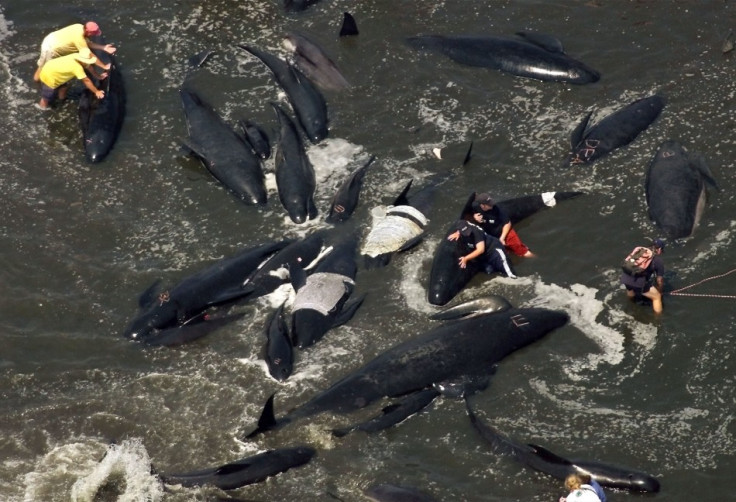Mass stranding in Tasmania sandbar records 90 dead pilot whales
Australian authorities race against time to save what is left of the 270 stranded pilot whales that are stuck in relatively inaccessible locations.
About 270 pilot whales have beached themselves in Strahan, Tasmania leaving Australian authorities in a rush to save hundreds of them from dying. The mass stranding was discovered on Monday as the whales were found scattered along two sandbars and stuck in the shallow waters on the west coast of the island.
According to the Tasmanian Marine Conservation Program leading the rescue operation, about a third of the animals have already died as a lot of them are spread out across areas that are inaccessible. Rescue crews were able to successfully guide 25 of the animals back to sea as they continue efforts to escort more of the whales back to open water.
The rescue teams, which number to about 60 people from volunteers to wildlife service, and police are racing against time. They have no choice but to start with the whales that are on the deeper end of the water and appear to have the best chance of survival.
Trained rescuers were seen using equipment to "re-float" and push the whales off the sandbar to keep them from getting dry. However, the team is also faced with problems of unpredictable tides washing in as well as the possibility of shark attacks that could be attracted to the pod of distressed whales.
Wildlife biologist Dr Kris Carlyon said, "Normally we're dealing with animals high and dry on the beach. This is different. We've got animals semi-buoyant so it probably won't take too much to re-float them - just involves a bit of grunt."
Dr. Carlyon pins his hopes on using boats to help manoeuvre the whales out but fear the whales could be too big and stuck in an unsuitable location for boats to come through. Pilot whales are known to grow up to seven metres long and weigh as much as three tonnes.
The cause of the mass stranding is still unknown although marine biologists say whale beachings are quite a common occurrence in the region. However, this sizeable number of whales stranded has not been seen in more than a decade, the BBC reports.
As seasonal migrations take place each year, pods as large as 1,000 whales and dolphins move across Australia and New Zealand. Researchers say each pod follows a leader. Being highly social species, these sea creatures form a strong social bond which can cause them to follow a stray and lead whole groups into beaching themselves.

© Copyright IBTimes 2025. All rights reserved.





















